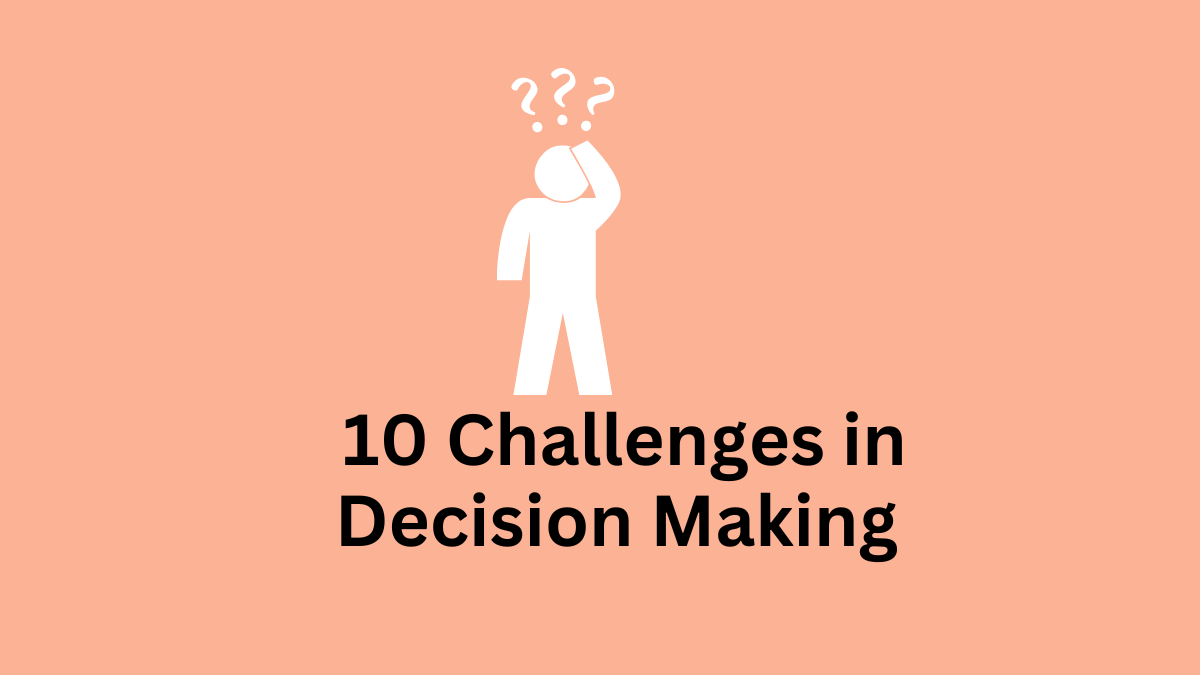Challenges in Decision Making
Decision-making in the workplace is a critical aspect of leadership and organizational success. However, it comes with its own set of challenges that can hinder effective decision-making processes.
In this article, we will explore 10 common challenges in decision making and relevant strategies to overcome them.
Complexity of Decisions
Challenge: Workplace decisions often involve complex issues with multiple variables and uncertainties.
Strategy: Break down complex decisions into smaller, manageable components. Use decision-making frameworks such as SWOT analysis or cost-benefit analysis to evaluate options systematically. Seek input from relevant stakeholders to gain diverse perspectives and insights.
Time Constraints
Challenge: Pressure to make quick decisions due to tight deadlines or urgent situations can compromise the quality of decision-making.
Strategy: Prioritize tasks and allocate sufficient time for decision-making processes. Identify critical decision points and focus on gathering essential information to make informed choices efficiently. Delegate tasks and responsibilities to team members to streamline decision-making processes.
Information Overload
Challenge: Overabundance of information can overwhelm decision-makers, leading to analysis paralysis or reliance on biased data.
Strategy: Filter and prioritize information based on relevance and significance to the decision at hand. Utilize decision-support tools and technologies to organize and synthesize complex data effectively. Seek input from subject matter experts or utilize external resources to validate information and insights.
Risk Aversion
Challenge: Fear of failure or negative consequences can deter decision-makers from taking calculated risks or pursuing innovative solutions.
Strategy: Foster a culture of psychological safety where team members feel empowered to take risks and experiment with new ideas. Encourage open communication and constructive feedback to mitigate fears of failure. Implement risk management strategies such as scenario planning or contingency planning to minimize potential risks.
Confirmation Bias
Challenge: Decision-makers may unconsciously favor information that confirms their existing beliefs or biases, leading to suboptimal choices.
Strategy: Challenge assumptions and seek diverse perspectives to counteract confirmation bias. Encourage critical thinking and skepticism when evaluating information and alternative viewpoints. Implement decision-making processes that include devil’s advocacy or red teaming to test assumptions and uncover blind spots.
Read More: 10 Challenges in Outsourcing
Groupthink
Challenge: Group dynamics and social pressures within teams can inhibit dissenting opinions and lead to consensus-driven decision-making.
Strategy: Promote a culture of constructive debate and dissent where team members feel comfortable expressing diverse viewpoints. Encourage devil’s advocacy and assign roles such as devil’s advocate or challenger to stimulate critical thinking and challenge groupthink. Foster an environment of psychological safety where individuals feel empowered to voice dissenting opinions without fear of reprisal.
Emotional Influences
Challenge: Emotions such as fear, stress, or excitement can cloud judgment and influence decision-making processes.
Strategy: Practice emotional intelligence and self-awareness to recognize and manage emotions during decision-making. Take a step back and assess decisions objectively, considering both rational and emotional factors. Implement mindfulness or relaxation techniques to promote clarity and focus during high-pressure decision-making situations.
Read More: 10 Challenges in Participative Management
Decision Fatigue
Challenge: The cumulative effect of making multiple decisions over time can deplete cognitive resources and impair decision-making effectiveness.
Strategy: Prioritize decisions based on their importance and impact, delegating less critical tasks when possible. Implement decision-making routines or protocols to streamline repetitive processes and reduce decision fatigue. Take regular breaks and engage in activities that replenish mental energy, such as exercise or mindfulness practices.
Conflict Resolution
Challenge: Disagreements or conflicts among team members can hinder consensus-building and decision implementation.
Read More: 10 Challenges in Planning in Management
Strategy: Facilitate open communication and active listening to understand underlying concerns and perspectives. Mediate conflicts proactively, seeking mutually beneficial solutions that address the interests of all parties involved. Establish clear decision-making protocols and conflict resolution mechanisms to resolve disputes effectively and maintain team cohesion.
Implementation Challenges
Challenge: Difficulty translating decisions into actionable plans or initiatives can undermine the effectiveness of decision-making processes.
Strategy: Develop clear and concise action plans with specific goals, timelines, and responsibilities outlined. Communicate decisions transparently to relevant stakeholders and solicit feedback to ensure alignment and buy-in. Monitor progress and adapt implementation strategies as needed to address unforeseen challenges or changes in circumstances.
Hence, these are the 10 challenges in decision making and strategies to overcome them.
Read Next: 10 Challenges in Social Responsibility
